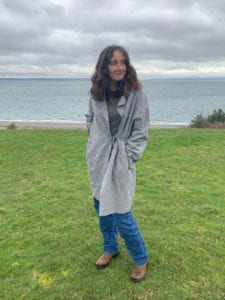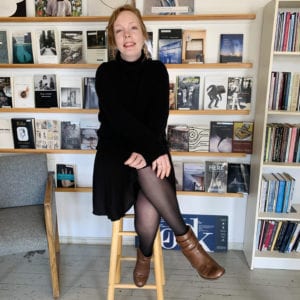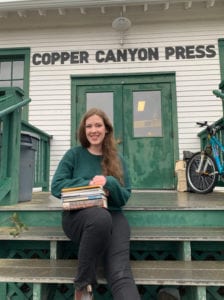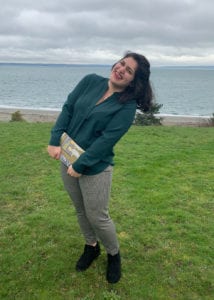We’ve welcomed a fantastic team of interns to the Press this spring, and it’s our pleasure to introduce you to each of them. Check back here every #MeettheInternMonday as we post a new 60-Second Q&A for the next five weeks.
P.S. Interested in interning with us this summer? Applications are due March 15! Learn more.
Meet Penelope
 CCP: What’s your favorite aspect of the intern experience at Copper Canyon Press so far?
CCP: What’s your favorite aspect of the intern experience at Copper Canyon Press so far?
P: One thing I love about this internship is the fact that nobody here takes their job lightly. Sure, we all have fun, but everyone I have met has a deep sense of responsibility for the work that they do, and approach their work with intention. It is an honor to be able to read something that someone has spent countless hours crafting, regardless of whether or not it ends up as a Copper Canyon title. I am so grateful to be a small part of that.
CCP: Please tell us about a forthcoming Copper Canyon title you’re excited about, and why.
P: One title that continues to stun me is Obit by Victoria Chang. This work explores the daily manifestations of grief after the loss of a loved one (in this case the speaker’s mother). Chang masterfully pens obits to what dies along with the mother—memory, appetite, the mother’s favorite potted tree. This work showcases the enormity and breadth of grief, how it infuses the quotidian. How it changes. And changes. And changes.
CCP: Please give us a line from a poem that you can’t get out of your head.
P: This line is from a poem called “Self-Portrait with My Dead Looming behind Me” by Diane Seuss. “They,” here, refers to “her dead:” “They fan behind me like the tail of a strange bird, // or like a deck of cards in the hands of a fly-by-night / magician: Pick a card, he says. Any card.” These lines are special to me. They speak to the transformative power of creation as well as the limits of that power.
Meet Morgaine
 CCP: What’s your favorite aspect of the intern experience at Copper Canyon Press so far?
CCP: What’s your favorite aspect of the intern experience at Copper Canyon Press so far?
M: As the production intern, I’ve worked directly with forthcoming manuscripts in a variety of ways. Not only do I enjoy working with the littlest details, as I’m called to do, but I’ve also been handed real responsibility. I appreciate this immensely. Each manuscript is a piece of a poet’s passion, time, hopes—to have even a slight part in honoring that piece by producing a polished book is not something I take lightly.
CCP: Please tell us about a forthcoming Copper Canyon title you’re excited about, and why.
M: I’m so glad the world is receiving the gift that is Indigo by Ellen Bass. In this collection, no daily moment or task is too small to become both musical and meaningful in Ellen’s hands. The barrier between our inner and outer lives is broken down and spread from page to page. But most importantly, as a young queer woman engaged to my dream girl, I can’t quite say what it means to see my own identity reflected in poems of love and marriage.
CCP: Please give us a line from a poem you can’t get out of your head.
M: After reading Vantage by Taneum Bambrick, I couldn’t get this out of my head, from the poem “This is a Target:” “This is the most giant American flag…. Hot water on the hot sand. A little red knife you got from your dad.”
Meet Lily
CCP: What’s your favorite aspect of the intern experience at Copper Canyon Press so far?
L: We are asked to compile samples of manuscripts and select the poems that embody the work and provide descriptions. This is my dream internship: reading, analyzing, and organizing poetry. Copper Canyon Press’s mission statement—poetry is vital to language and living—resonates with me. After arriving here, I can see that everyone who works here truly upholds this ideal.
CCP: Please tell us about a forthcoming Copper Canyon title you’re excited about, and why.
L: The much anticipated Deluge by Leila Chatti, forthcoming April 2020, is a book I cannot wait to get my hands on. The tension of religion underscored by such a vulnerable and visceral divulgence of her illness will make an interesting read. It is so stunning and admirable to see a poet unabashed in discussing sensitive topics in a powerful way.
CCP: Please give us a line from a poem you can’t get out of your head.
L: A line of poetry I keep going back to is from the poem “Silly String” found in Dean Young’s Solar Perplexus: “The kaleidoscope remains the most / efficacious diagnostic instrument/ for those of us who’ve been shattered.”
Meet Emily
 CCP: What’s your favorite aspect of the intern experience at Copper Canyon Press so far?
CCP: What’s your favorite aspect of the intern experience at Copper Canyon Press so far?
E: I’ve been so impressed with the amount of trust and responsibility the wonderful Copper Canyon staff has instilled in us. A fellow intern and I are currently working to bring copies of Ellen Bass’s new book, Indigo, to poetry workshops for incarcerated people across the country. I’m grateful to be a part of a program that actively works to bring poetry to communities who may not otherwise get to experience its transformative potential.
CCP: Please tell us about a forthcoming Copper Canyon title you’re excited about, and why.
E: I’m so excited for the release of Traci Brimhall’s fourth collection, Come the Slumberless to the Land of Nod. I’m fascinated by how Brimhall uses the tender beauty of the lullaby to reckon with jarring, sometimes violent undercurrents: death, divorce, a friend’s murder, the birth of her child. This is a collection of incantatory counterpoints—there are so many opposing forces working to create a strange, surreal, and utterly gorgeous landscape in which we can explore how to remain hopeful and loving in the face of life’s cruelties.
CCP: Please give us a line from a poem you can’t get out of your head.
E: I keep returning to these lines from D.A. Powell’s beautiful poem “Reaching Around for You:”
“Because virtue was hardly what either of us saved / from our separate, desperate beginnings. And because / stonefruit from a tin is almost as good as fresh, / when the spiteful frost arrives.”
Meet Tess
CCP: What’s your favorite aspect of the intern experience at Copper Canyon Press so far?
T: Copper Canyon Press exists for poetry. Instead of treating poetry as a product, the Press places poetry at its core with the unshakable belief that “poetry is vital to language and living.” One of my favorite parts of this internship has been watching that belief guide every decision here at Copper Canyon. Discovering this reverence for an art form that I have loved my whole life—yet that my educators have often viewed as frivolous—has validated my choices and passions, and it has been such a relief to find a community of powerful people who hold the same faith in the transformative power of poetry as I do.
CCP: Please tell us about a forthcoming Copper Canyon title you’re excited about, and why.
T: I am greatly looking forward to Chessy Normile’s APR/Honickman debut collection, Great Wall, Great Exodus, Great Party, which will be published in Fall 2020. Normile’s poems paint a mind scrabbling for answers to an unknown question, grabbing hold of any philosophy, portent, or crack in the sidewalk, then dropping it as soon as the light shifts. I recognize that mind; it is young, and needy, and beautiful for it.
CCP: Please give us a line from a poem you can’t get out of your head.
T: The words “diaphanous lymph” play in my head a lot, from Elizabeth Bishop’s “Night City.” The full stanza reads “Diaphanous lymph, / bright turgid blood, / spatter outward / in clots of gold.” I love the way these words sound and feel, and how the image is both ethereal and disgusting. It is a glorious reimagination of the human body.

